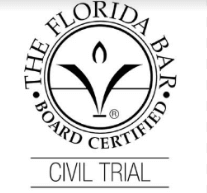
Can I Sue After a Car Accident If I Was Not Hurt?
Table of Contents
Injuries aren’t the only complication experienced by car accident victims. Accidents can cause other types of damages beyond physical injuries. If you’ve been in a car accident in Florida and were not physically hurt, you may still have grounds to file a lawsuit. Here’s what you need to know about filing a lawsuit in Florida after an accident that didn’t result in personal injuries.
Types of Damages You Can Claim
Even without physical injuries, a car accident can lead to significant financial losses and emotional distress. These changes can negatively impact your quality of life. Here are some types of damages you might be able to claim:
- Property Damage: If your vehicle or other personal property was damaged in the accident, you could seek compensation for repairs or replacement. This is often the most straightforward claim and is typically handled through insurance. However, if the insurance company disputes your claim or offers an insufficient amount, legal action might be necessary.
- Lost Wages: If the accident caused you to miss work, you might be entitled to recover lost wages. This includes the time you spent dealing with car repairs, attending medical appointments or managing other accident-related issues.
- Pain and Suffering: Emotional distress and mental anguish resulting from the accident can also be grounds for a lawsuit. Even without physical injuries, the trauma of the accident can affect your quality of life, leading to stress, anxiety and other emotional challenges.
- Diminished Value: Sometimes, even after repairs, a vehicle may lose value due to its accident history. You might be able to claim the difference in your car’s market value before and after the accident.
To help ensure you receive the compensation you need, it’s important to work with a Florida personal injury lawyer. Your lawyer can identify the types of compensation to which you may be entitled, negotiate with insurance companies and even bring your case to court if necessary.
Proving Your Case
To receive compensation for damages after a car accident, you must prove a clear connection between the accident and your losses. Here are some important steps to take to protect your right to compensation for damages:
- Gather Evidence: Collect all relevant evidence from the accident scene, including photos, videos and witness statements. Obtain a copy of the police report, as it provides an official account of the incident.
- Keep Detailed Records: Maintain records of all expenses related to the accident. This includes repair bills, rental car receipts and any other costs you incurred. If you missed work, document the hours or days you were absent and provide evidence of your lost wages.
- Consult with Experts: In some cases, expert testimony may be necessary to establish the extent of your damages. This could include appraisers for vehicle value or mental health professionals for emotional distress.
Taking these steps can help you build a case for compensation even if you do not have any physical injuries. A Florida personal injury lawyer can help ensure you have all the evidence you need to present a strong case.
Legal Grounds for a Lawsuit
You don’t need to have any injuries to sue for accident-related damages in Florida. Here are some potential grounds for filing a lawsuit if you’re the victim of a car accident:
- Negligence: Many car accident lawsuits are based on negligence. To prove negligence, you must show that the other driver owed you a duty of care, breached that duty and caused your damages. Even if you don’t have any physical injuries, you can demonstrate how the other driver’s actions led to your financial and emotional damages.
- Breach of Contract: In some cases, if an insurance company fails to honor the terms of your policy, you may have grounds for a breach of contract claim. This can occur if your insurer refuses to pay for covered damages or delays payment unreasonably.
- Bad Faith: If an insurance company acts in bad faith by denying your valid claim or offering an unreasonably low settlement, you might be able to sue for additional damages. Bad faith actions can include failing to investigate your claim promptly, requiring unnecessary paperwork or misrepresenting policy terms.
When considering legal action, you need to take into consideration the statute of limitations. The statute of limitations in Florida for lawsuits related to car accidents is generally four years. Consult with a personal injury lawyer to confirm the statute of limitations in your particular case. FIling a lawsuit too late may lead to you being unable to receive compensation.
Seek Legal Assistance
Building a strong case for compensation can be challenging. WIthout the right knowledge and experience, you may not receive the compensation you need for all your losses. This is why it’s important to work with a personal injury lawyer. A personal injury lawyer can help ensure your rights are protected and improve your chances of a successful outcome.
Suing after a car accident in Florida when you are not physically hurt is possible, but it requires careful documentation. You need to make it clear that your losses were caused by the accident. By identifying all potential damages and seeking professional legal assistance, you can work towards a favorable solution.
Contact Kogan & DiSalvo For Help
At Kogan & DiSalvo Personal Injury Lawyers, we have extensive experience handling a wide range of car accident cases in Florida. Our team is committed to helping you achieve the best possible outcome for your case.
If you’ve been in a car accident and you’re suffering personal injuries, financial losses or emotional damages, contact us today for a free case evaluation. We are dedicated to helping accident victims receive the care and compensation they deserve. Our car crash attorneys are here to support you in Boca Raton, Boynton Beach, Delray Beach, Ft. Lauderdale, Lakeland, Palm Bay, St. Petersburg, Stuart, Tampa, Vero Beach, and West Palm Beach.
 (561) 375-9500
(561) 375-9500

 Call
Call





